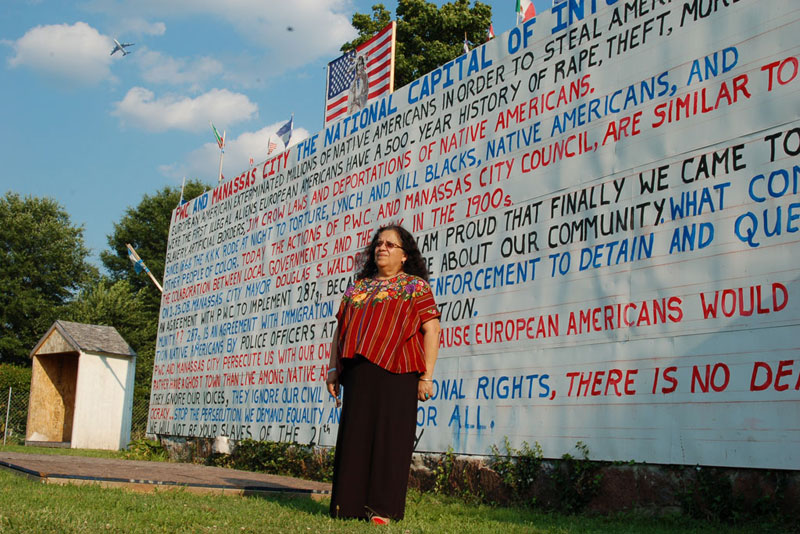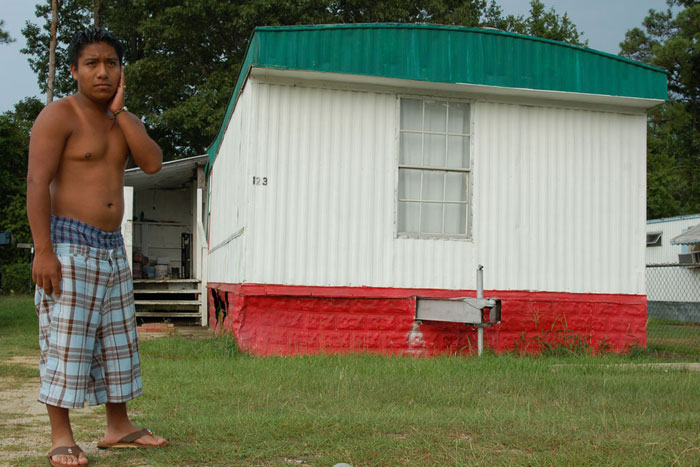Este artículo también está disponible en: Español
Wednesday, October 8th 2008If she could sit down for a talk with Barack Obama or John McCain, Diane Schnell would not ask them about the economy or the war. She wants to know what they really think about immigration.
The daughter of Honduran parents, Schnell, 37, who was born and raised in New Orleans, says the two candidates have not been clear on their position.
“The Hispanic community wants to be secure that they’re going to be respected, treated the same, not profiled, and that they won’t be harassed for being here,” says Schnell, a marketing director for the recently launched Telemundo affiliate in New Orleans.

- Thanks to a local anti-immigration law, Manassas, Va., looks like a "ghost town,” says activist Teresita Jacinto. (Photos: Diego Graglia)
Recent polls show that immigration is a concern many Latinos keep on the front burner, though this election season it’s more like the elephant in the room — prominent but unspoken about.
“Let he who will give papers win,” says a half-joking Olegario Huerta, 50, manager of Mexico Lindo restaurant in Smithville, Tex. Huerta can’t vote because he is a legal resident, not a citizen.
“As Hispanics, we should be neither Democrat nor Republican,” said César Castle, 63, a Colombian-born community activist who runs a Spanish-language newspaper in New Orleans and is an American citizen. “We should vote for whoever pledges to help us.”
Over the past two years, one in 10 Latinos, regardless of citizenship status, has been stopped by law enforcement officers with questions about their immigration status, according to a national Latino survey released by the Pew Hispanic Center last month.

- Diane Schnell, news director, and María Juliana River, anchorwoman, of New Orleans' first-ever Spanish-language TV newscast.
Sheriff and police departments in numerous counties and towns across the country are now enforcing immigration law, and in the past few months, Immigration and Customs Enforcement has dramatically increased the number of its raids in search of undocumented workers.
“People sold their homes, their kids dropped out of school, because [The police] could have taken them if they stayed,” said Beatriz Monge, a 21-year-old Salvadoran tending La Antorcha, an empty Salvadoran-Mexican restaurant in Manassas, Va.
Prince William County, where the town is, gained national attention when it passed a resolution allowing local law enforcement officers to inquire about the immigration status of people they arrest.
Since then, the Latino population has plummeted.
Some blocks where Latinos used to live now look “like ghost towns,” said Teresita Jacinto, an activist with the local group Mexicans Without Borders.
Jacinto was standing in front of what she calls The Wall of Liberty St., the last standing side of an accidentally burned-down house whose owner used it as a canvas to denounce the county’s hardened stance.
“European Americans would rather have a ghost town than live among Native Americans,” he wrote in red, black and blue block letters.
Candidates mum on hot issue
While immigration can be a daily concern for Latinos across the country, both Barack Obama and John McCain seem to address this potentially damaging issue only when they can’t help it.
Most often, they only mention it before Latino or other immigrant audiences, or on Spanish-language media.
Both parties’ conventions were telling. Obama’s acceptance speech dedicated only 33 words to the issue, some of them to say he did not want immigration to undermine American salaries.

- "Many candidates say they are going to allow legalization, then nothing happens," says Mario Córdoba.
McCain only said that “the Latina daughter of migrant workers” is among those who deserve “the opportunity to reach their God-given potential.”
No word on those migrant Latino parents. In fact, the Republican didn’t even use the words “immigrant” or “immigration.”
Both Obama and McCain have given interviews to Spanish-language network Univision in which they were more open on the subject.
McCain seemed to deny to Univision’s Jorge Ramos that he had voted in favor of the U.S.-Mexico border fence, although Senate records show he cast a “yea” on Sept. 28, 2006, when the Secure Fence Act was passed.
“I didn’t vote for, I am not sure what you are talking about,” McCain said at one point, according to the English transcript from Univision.
Obama said he views the immigration enforcement raids as a publicity trick by the Bush administration.
His wife, Michelle, during a visit to Los Angeles Spanish-language radio station La Nueva, told host Eddie “Piolín” Sotelo that if Obama is elected President, immigration “will be at the top of his agenda, you know, along with ending this war in Iraq responsibly.”
For these stories, reporter Diego Graglia traveled from New York to Texas with stops in Virginia, North Carolina, Georgia, Louisiana and Florida, interviewing Latinos about the elections.
 Every-Night Fever at the Milonga (2007)
Every-Night Fever at the Milonga (2007)  Migrants Suffer in Mexico (2006)
Migrants Suffer in Mexico (2006)  Leaving Wall Street (2006)
Leaving Wall Street (2006)  Torn Up Over Being Torn Down (2004)
Torn Up Over Being Torn Down (2004) 


